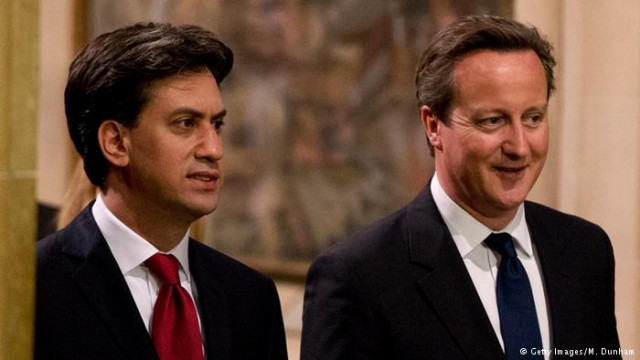Too close to call: Uncertainty looms as UK elections head for dead heat
Opinion polls say none of the party will win enough seats for an outright majority in the 650-seat parliament

PHOTO: DW
Britons voted on Thursday in the tightest election for decades, one that could cause government gridlock, push the world’s fifth-largest economy closer to leaving the European Union and stoke a second attempt by Scotland to break away.
Final opinion polls showed Prime Minister David Cameron’s Conservatives and Ed Miliband’s opposition Labour Party almost in a dead heat, indicating neither will win enough seats for an outright majority in the 650-seat parliament. However, the surveys suggested there had been some late movement towards Labour.
“This race is going to be the closest we have ever seen,” Miliband told supporters in Pendle, northern England, on the eve of the vote. “It is going to go down to the wire,” he added.
Cameron said only his Conservatives could deliver strong, stable government: “All other options will end in chaos,” he insisted.
Scottish hope
Voters in Glasgow said they hoped for a stronger voice for Scotland to see the Scottish National Party (SNP) make big gains and become a potential kingmaker at Westminster.
Opinion polls during the campaign put the SNP on course to win most of the 59 House of Commons seats in Scotland, giving them a strong hand in the likely event that no party wins an overall majority.
“Whatever the outcome, whatever party wins, they are going to need to change how they see Scotland as a political entity,” said John Lyons, a retired civil servant casting his ballot in Scotland’s biggest city.
Labour vs Conservatives
The Conservatives portray themselves as the party of jobs and economic recovery, promising to reduce income tax for 30 million people while forcing through further spending cuts to eliminate a budget deficit now running at 5 per cent of GDP, half the level it stood at when they took office five years ago.
Labour says it would cut the deficit each year, raise income tax for the highest 1 per cent of earners and defend the interests of hard-pressed working families and Britain’s treasured but financially stretched National Health Service.
If neither party wins an overall majority, talks will begin on Friday with smaller parties in a race to strike deals.
Published in The Express Tribune, May 8th, 2015.



















COMMENTS
Comments are moderated and generally will be posted if they are on-topic and not abusive.
For more information, please see our Comments FAQ